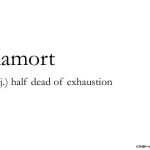When I was doing my GCSEs I had a really hard time with Maths, given I now work with statistics and adore data this probably seems crazy but I really found it hard to follow the GCSE syllabus and consequently spent many an unhappy hour crying over my textbook knowing I would face an overly strict teacher the next day. It was the pits, I dreaded the lessons, maths coursework had me a wreck and I felt very anxious about my grades.
My saving grace early in year 10 was a Maths tutor my parents found via an ex-teacher, Jo was brilliant, she came to my parents home once a week and spent an hour building my confidence, more than that I started to see a path through the haze of numbers and algebra slowly didn’t feel like Spanish to me. Jo encouraged me to lighten up a bit, she was someone I looked up to, and unlike my teacher who didn’t have the time to show me the basics that I had picked up wrongly she started afresh and it started to ‘click’. Some of this work took place in the summer holidays where I had the mental space from school to concentrate on key skills.
My parents and I would say that this tutoring was worth every penny, I couldn’t have continued on the same path without it and although my parents weren’t rich they saw how the tutoring increased my confidence and I think this made the expense worthwhile.
Tutorfair is a website that makes tutoring accessible for all. It’s easy to use, you search by putting in your postcode and subject, and voila, it picks the best tutor near you. Fifteen years ago we were lucky to find Jo, so I think anything that opens up the possibilities and makes tutoring more accessible has to be a good thing!
View everything from qualifications to videos of tutors, so you can get a better idea of what they are like and make the right choice for your child. Online payment makes booking easy, and if you’re not totally satisfied with your tutor after your first lesson, Tutorfair will give you your money back.
The big difference between Tutorfair and other traditional tutoring agencies is that Tutorfair gives something back – for every student who pays, Tutorfair gives free tutoring to a child can’t (the ‘fair’ bit).
Tutorfair’s Mark Maclaine really nicely illustrates the experience I had from tutoring and I would seek the same for J if she needed it. Mark talks about Comfort, Stretch and Panic Zones. In the ‘comfort’ zone, the learners are highly familiar with the situation. This includes everything they already know and tasks they can do almost without thinking. Students are comfortable here, feeling like they are in full control. But they are not learning. At the other end of the scale, in the ‘panic’ zone the situation is highly stressful or can seem dangerous to the learner. In this zone there is often a perception that the skill required for success is so far out of reach that it’s not even worth trying. Students in this zone can be overwhelmed, feeling like they have no control, and may ‘shut down’ entirely.
This was where I was when I really needed some support with my Maths. The trick to growth is to be somewhere in the middle, where the student is slightly uncomfortable but still learning. Mark hits the nail on the head when he says “a child who feels shame may find it hard to approach the teacher, but if your students are comfortable approaching you with concerns you can solve problems early on. The same thing goes for a parent. Opening up this dialogue with children helps them feel comfortable about coming to you if they ever feel overwhelmed in the future.”
With some careful support I succeeded in reaching the ideal zone for me, I was stretched and learning, but the panic lessened and I went on to improve from a predicted D grade to a B grade in my GCSEs, and I now know that there are many strands to Math, I love stats and I haven’t looked at algebra since!
Disclaimer: post in collaboration with Tutorfair
![Tutorfair Website[1]](https://www.headphonescheaponlinestoresale.com/wp-content/uploads/2015/08/Tutorfair-Website1.jpg)













What a lovely piece! Thanks for the mention too.
I’d love to take credit for the Comfort, Stretch, Panic Zone – however it was Karl Rohnke, based on the work of Lev Vygotski, who we can thank for this. Anyone interested in reading more about this should check them both out.
Mark